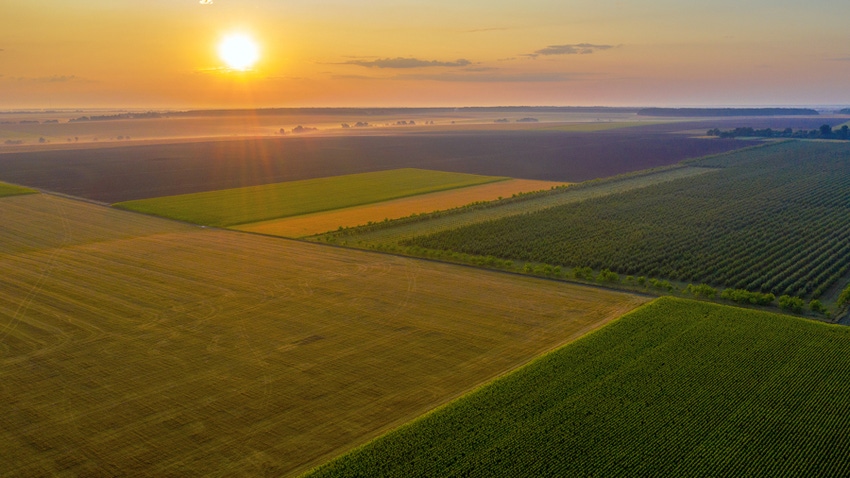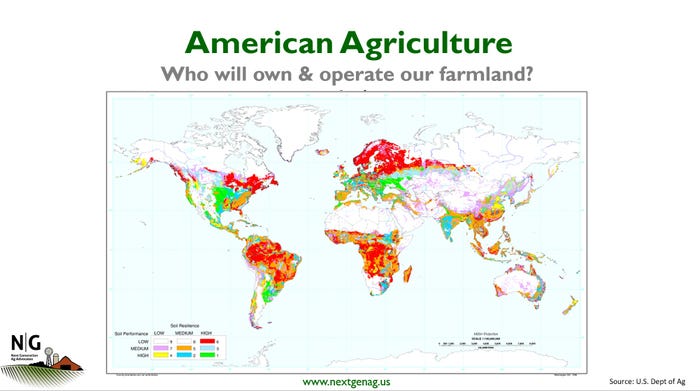
Last week I spoke at a bank farm appreciation dinner, and I showed the audience the map below of the arable land worldwide:

The mass of green across the corn belt represents the most productive farmland in the world. This provides American farmers huge opportunity and I think the future of agriculture is bright. I asked the audience:
“Why do farmers farm?
“Why do farmers buy farmland?”
Some common responses:
“It’s all we know.”
“It’s in our blood.”
“It’s our livelihood.”
“It’s a great way of life.”
“It’s what we were born to do.”
“It’s a great way to raise a family.”
These are all great reasons, which resonate with many of us who work in agriculture. This supports why farmers purchase the majority of farmland when offered for sale. According to recent surveys conducted by land brokers and ag universities, farmers represent 65% of all farmland purchasers.
I also asked the audience about the other 35% of land buyers: investors, professional athletes, and other non-farmer groups. What are their reasons for buying land?
“Diversification.”
“Because they can.”
“A hedge against inflation.”
“A proven, long-term asset.”
“An investment in the future of food production.”
If there’s one factor we can agree on why they aren’t buying farmland, it is for its strong “return on investment.” This is especially true as land prices have reached new plateaus and seem to have strong underlying support, despite higher interest rates and softening commodity prices.
This led to some interesting questions and discussion during the Q-A session afterward:
“I’m a farmer, but does it even make sense for us to buy land anymore?”
“I’m not a farmer. But, is it a bad thing if I buy land and rent to a local farmer?”
“Maybe we need more professional athletes buying the land and we rent it from them?”
Right or wrong?
One of the audience members asked me if I thought it was a bad thing if wealthy investors or professional athletes buy land. This was a difficult question to answer then, and I’m not sure I have a good answer now. The farm kid in me thinks it’s a bad thing. Those in my grandfather’s generation probably didn’t have to compete with the outside influences farmers have today. However, my grandparents crop shared most of their acres; They bought farms mainly with money from those farms, without off-the-farm subsidization. Back then, when it was time to rent your farm, you rented it to a friend, extended family member, or another farmer down the road.
Today, we operate in a competitive cash rent environment. New farm purchases do not cash flow on their own. Most farm operations I work with rely on income from other enterprises or off-the-farm sources. For these reasons, maybe we do need more non-farmer buyers of land.
A key characteristic of the next generation of producers may be the relationships they hold with the future owners of farmland: inheritors of farmland, investors, and non-farming groups such as institutional buyers and professional athletes.
This is a trend which will likely continue and the reality of the current farm economic environment.
The same surveys noted above also estimate over one-third of farmland is owned and controlled by those with no farm experience, those who are further removed from agriculture, and likely don’t have the local neighborhood relationships the generations before them had.
These are questions I think all farmers should be asking themselves:
Where will future buyers of land go to get their information?
How can you find and align yourself with future buyers of farmland?
What will those more removed from agriculture find if they google: how do I rent my farm?
Downey has been helping farmers and landowners for the last 23 years with their family farm transition, estate planning, leasing strategies, and general farm advising. He is the co-owner of Next Gen Ag Advocates and an associate of Farm Financial Strategies. Reach Mike at [email protected].
Read more about:
FarmlandAbout the Author(s)
You May Also Like






